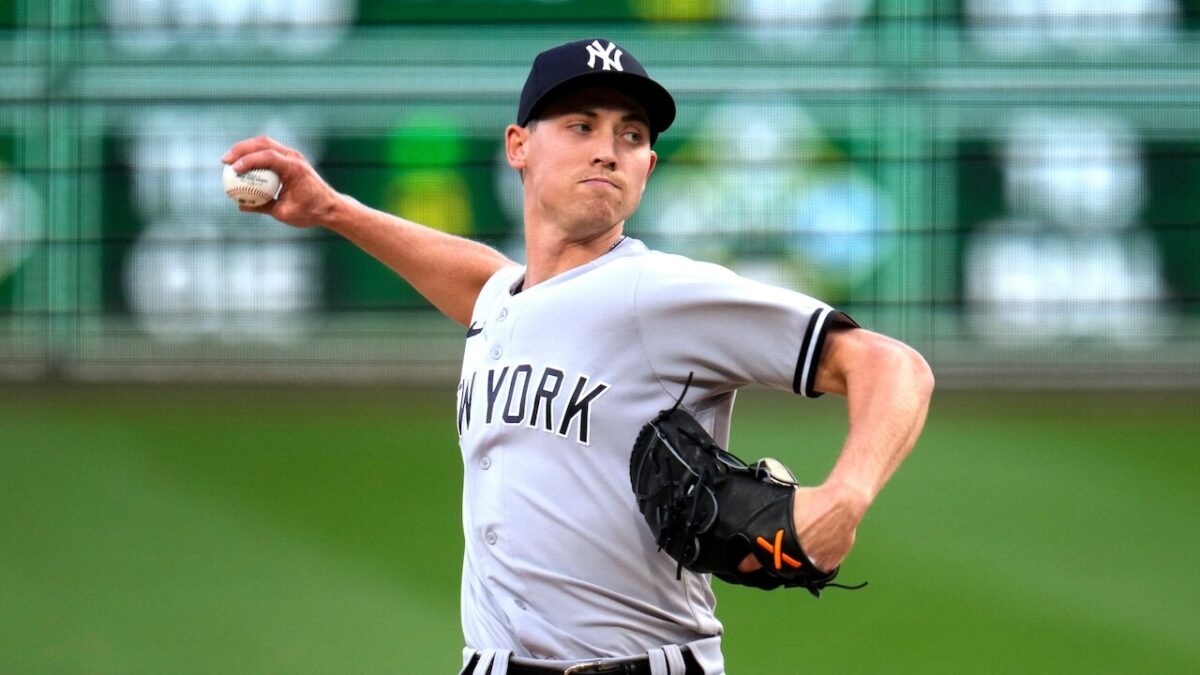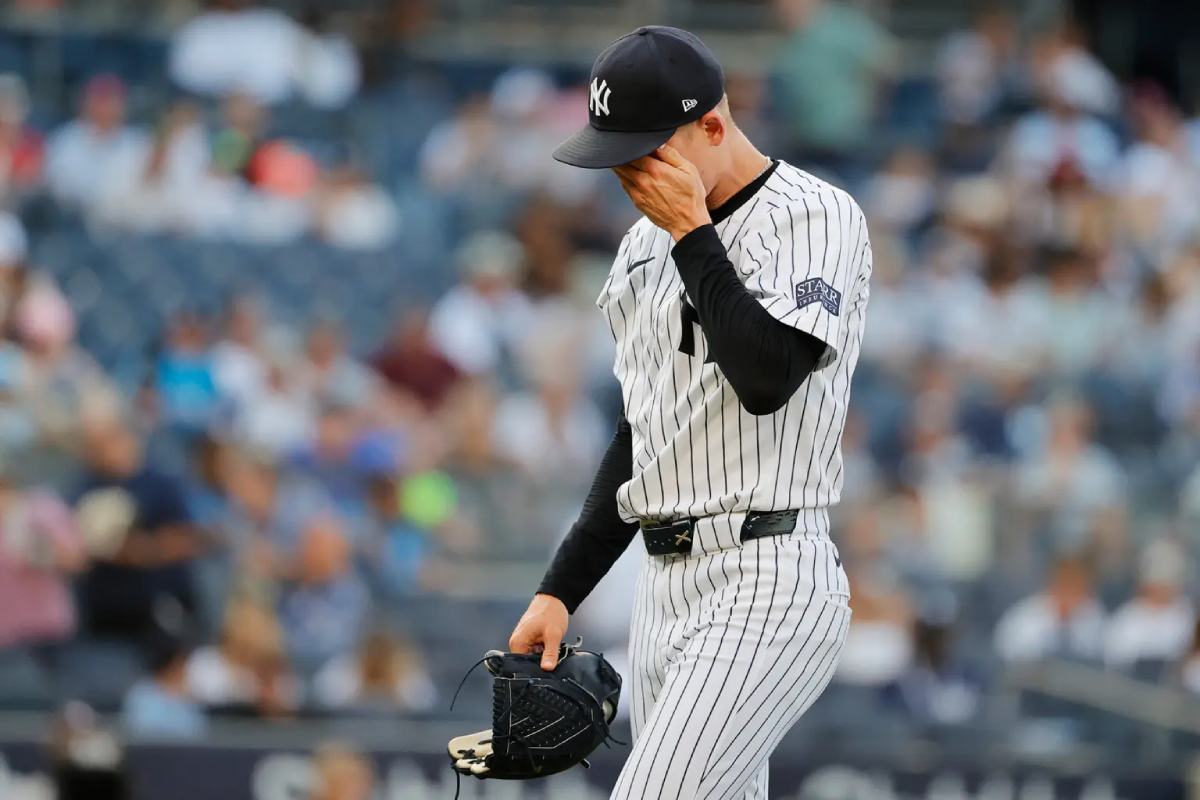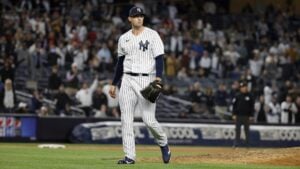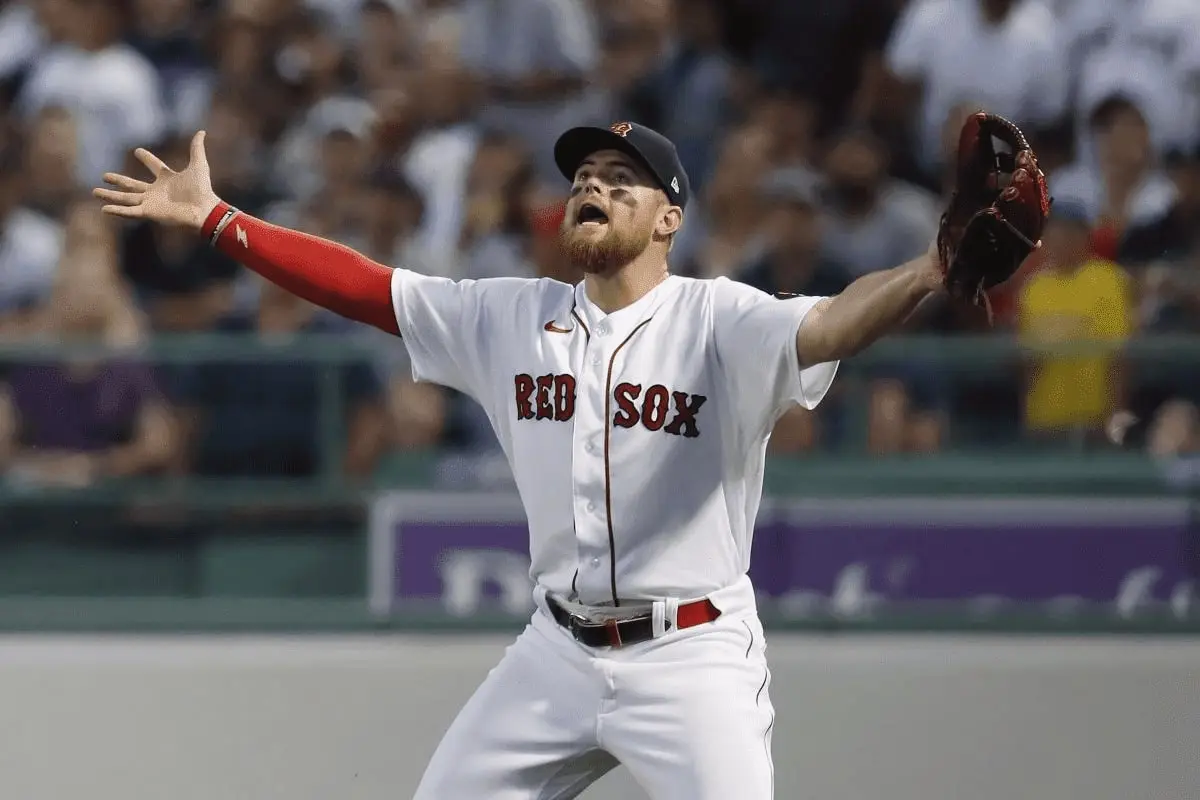Yankees’ Luke Weaver tenders ‘short starts’ apology to ex-mates


Esteban Quiñones
More Stories By Esteban Quiñones
- Mother’s Day: How Anthony Volpe’s mom molded him into a Yankee phenom
- Juan Soto rumors ignite hope among Yankees fans eyeing championship future
- Yankees upgrade Juan Soto offer to $630M, pitch lucrative endorsement perks
- Who is Dave Sims, the one chosen to fill John Sterling’s big shoes at Yankees booth?
- Yankees weighing Alex Bregman pursuit as Juan Soto decision looms
Table of Contents
In a candid 20-minute segment on “Foul Territory,” New York Yankees reliever Luke Weaver took the opportunity to tender an apology to his former teammates, shedding light on his evolving perspective since transitioning to a late-inning relief role this season. The pitcher, who has spent most of his nine-year career as a starting pitcher with less success, spoke about the newfound respect he’s gained for relievers after making the switch.
When asked about his transition, Luke Weaver offered a heartfelt acknowledgment of the critical role that relief pitchers play in the game. He expressed a desire to apologize to all the relievers he had played alongside throughout his career, admitting that while there were times he may have eased their workload, there were many instances when he did not.
“The big thing, from starting to relieving is like, I just wanted to apologize to all the relievers that have been on my team through the course of my career, and just be like, man, yeah, there’s days when I feel like maybe I helped you all out and you didn’t have to throw as much, but there’s plenty of days where I didn’t,” Luke Weaver said. “I just want to be like, I’m sorry, I didn’t realize really, I don’t think starters — unless they’ve done relieving — really realize how much of a backbone they are in keeping the game intact.
Luke Weaver confessed that as a starter, he hadn’t fully grasped how his performance could impact the bullpen. He acknowledged that starting pitchers who haven’t been in relief roles might not fully appreciate the importance of relievers in preserving a game, especially during the high-stress late innings.
At 30 years old, Luke Weaver highlighted the relentless demands faced by relief pitchers, including the need to be perpetually ready to pitch and the daily grind that comes with the role. He emphasized the deep respect he now holds for the position, a respect that has grown since he embraced his new responsibilities.
Reflecting on his past performances as a starter, Luke Weaver expressed regret for some of his shorter outings and reiterated his newfound appreciation for the challenges of being a relief pitcher. His comments reveal a humbling shift in perspective, brought on by his recent experience in the bullpen.
“And just really through the finish and the day to day, being prepared to throw and the grind that comes with that,” the Yankees’ reliever told. “There’s just a lot of respect that’s been gained … I didn’t mean to have some short starts, but I do respect more than anything, what it takes to be in that position.”
Luke Weaver highlights a true state of pitching affairs
Luke Weaver’s reflections offer valuable insight into the contrasting demands of starting and relief pitching, and how stepping into both roles can lead to a greater understanding and respect for the complexities of Major League Baseball.

Luke Weaver’s shift to a relief role has not only provided him with a fresh perspective but has also breathed new life into his career. As a reliever, Weaver has delivered a solid performance, boasting a 3.50 ERA with 70 strikeouts over 64 1/3 innings, and recording 18 holds. This turnaround can be partly credited to adjustments in his pitch selection.
His career trajectory adds depth to his newfound respect for relief pitching. Drafted in the first round by the St. Louis Cardinals, Weaver’s tenure as a starting pitcher was marked by inconsistency. Luke Weaver surpassed 100 innings in a season only twice, and despite numerous chances to establish himself in the rotation, he struggled, posting a 5.05 ERA across 520 innings.
Even after a tough 2022 season, where he primarily pitched out of the bullpen and logged a 6.56 ERA, Weaver was granted more opportunities to start in 2023. This included three starts with the New York Yankees, who claimed him off waivers from the Seattle Mariners after he had been designated for assignment twice in a single month.
Luke Weaver’s transition from a struggling starter to a reliable reliever underscores the complexities of pitching roles in baseball and the potential for career revitalization through adaptability. His success in the bullpen, along with his new appreciation for the role, underscores the significance of flexibility in professional baseball and the essential contributions of relievers to a team’s overall success.
His recent remarks, laced with humor, highlight a serious point about the often-overlooked importance of relief pitchers in baseball. While relievers may spend less time on the mound than starters, the challenges they face are distinct and demanding, deserving more recognition.
What do you think? Leave your comment below.
- Categories: luke weaver
- Tags: luke weaver


 Follow Us
Follow Us










Great article, but I think you overlooked the Most Important Point Weaver made in his erudite comments about Starting Pitchers when you wrote the following:
“His recent remarks … highlight a serious point about the often-overlooked importance of relief pitchers….”
No! His remarks HIGHLIGHT THE IMPORTANCE OF STARTERS GIVING THEIR TEAM MORE THAN 5 INNINGS because that puts a HUGE BURDEN on The Bullpen!
Weaver Rightly Stressed that point when he “expressed regret for some of his shorter outings” and “the challenges” that that presented for relievers.
This is a major reason I don’t ever want to see Blake Snell in pinstripes: because Snell typically KILLS your bullpen, averaging 5.1 IP, which means the bullpen must pitch almost as many innings as Snell, every time he starts a game. That’s great for lazy-ass Snell, but a recipe for Disaster for the rest of the team!
Snell recently threw a complete-game no-no, which is laudatory, but what is NOT laudatory and is in fact UNBELIEVABLE, is that that’s the FIRST TIME in his 9-YEAR CAREER that Snell EVER threw a pitch in the 8th Inning, let alone the 9th Inning!
That’s right, it took Snell almost 9 Full Years to ever throw a pitch in the eighth inning, so, of course, that was also the ONLY Complete Game in his career.
Yankee fans — and especially Brainless Brian Cashman, if he’s not fired after this year — and should take note that the Yankees EXCELLED this year when the Starters were giving them 6+ IP (remember that?), and . . .
As soon as that ended and the RELIEVERS had to throw a ton of IP, the Yankees went into a Massive Tailspin. Yes, the hitters (other than Soto & Judge) later added to the misery, but it all started when the Starters STOPPED giving us 6+ IP. Remember that & the impact it had on the team’s performance.
Btw, Snell fans, even with his complete game this year, Snell is still pitching just a touch over 5 IP as a start in ’24, and Snell has NEVER pitched 200 innings, in fact, he’s only pitched 180 twice in 9 years. (Btw, Cole’s pitched 200+ 6 times!)
And anyone who says, 5.1 IP from Snell is worth it:
a) Wasn’t Paying Attention to Weaver’s Message about the Importance of Length from Starters.
b) Hasn’t looked Closely at Snell’s career stats, because in his SEVEN non-Cy-Young seasons, his ERA has NEVER been below 3 in any of those seasons, and it’s been over 4 in three of those seasons, and currently sits at 3.91, even after his no-hitter.
c) Is overlooking the fact that Snell only seems to wake up & pitch exceptionally when BIG $$$ are on the horizon. For example, he was mediocre-to-fair with San Diego in ’21 & ’22, pitching a Mere 128 innings each year, with a combined 15-16 record, until his 2023 Walk-Year, when he went 14-9 with only his 2nd sub-3 ERA of his career.
Then, after he got a “measly” $30MM per from the Giants, he sucked in his early starts, until he realized he wouldn’t be able to opt-out of year 2 of his Giants deal if he didn’t stop pitching like sh*t, and he started pitching well. That should be a warning sign to every Yankee fan who calls on the Yankees to piss-away millions on a 5+ year deal to Snell this off-season because you will regret that deal, based on HIS pitching history.
If you want to know what a Great Pitcher looks like who’s Worth $35+ MM per year, compare Snells’ stats to Cole and Verlander, who give you Massive IP & quality starts. It’s embarrassing to put Snell in their Class.